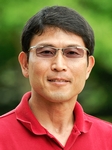Eight Hamilton College faculty members were approved for tenure by the College's Board of Trustees during their recent meeting. The Board granted tenure to Heather Buchman (music), Jennifer Irons (sociology), Masaaki Kamiya (East Asian languages and literatures), Katherine Kuharic (art), Mike McCormick (biology), Tara McKee (psychology), Kyoko Omori (East Asian languages and literatures) and Sharon Werning Rivera (government).
The granting of tenure is based on recommendations of the vice president for academic affairs and dean of faculty, and the committee on appointments, with the president of the college presenting final recommendations to the board of trustees. The tenures are effective July 1. With the granting of tenure comes the title of associate professor.
 Heather R. Buchman is music director of the Hamilton College Orchestra, Brass Ensemble, and the chamber music program. She has guest conducted the Syracuse Society for New Music, Monarch Brass, and the U.S. Coast Guard Band, and is founder of the KAIROS Chamber Orchestra. She was among the first recipients of a Women Conductors Grant from the League of American Orchestras. With the Hamilton College Orchestra she has instituted the annual Brainstorm! educational concert series.
Heather R. Buchman is music director of the Hamilton College Orchestra, Brass Ensemble, and the chamber music program. She has guest conducted the Syracuse Society for New Music, Monarch Brass, and the U.S. Coast Guard Band, and is founder of the KAIROS Chamber Orchestra. She was among the first recipients of a Women Conductors Grant from the League of American Orchestras. With the Hamilton College Orchestra she has instituted the annual Brainstorm! educational concert series.
Buchman completed professional studies in conducting at the Juilliard School. She holds an M.M. in orchestral conducting from the University of Michigan and a B. Mus. degree and Performer's Certificate from the Eastman School of Music. Buchman served as principal trombonist of the San Diego Symphony from 1988 to 1997. She has performed concertos with the San Diego, Canton Symphony (OH), and National Symphonies, the Bay Area Women's Philharmonic, and Concordia Orchestra; and premiered several new works for trombone.
 Jennifer Irons completed work for her master's degree and Ph.D. in sociology at the University of Arizona, Tucson. She has published in Gender & Society and Mobilization. Irons also has a book forthcoming with Vanderbilt University Press, titled Reconstituting Whiteness: The Mississippi State Sovereignty Commission. Her research interests include race, gender, social movements and culture. Her current research focuses on the relationship between the state, social movements and race. In 2006 Irons received the John R. Hatch Class of 1925 Excellence in Teaching Award.
Jennifer Irons completed work for her master's degree and Ph.D. in sociology at the University of Arizona, Tucson. She has published in Gender & Society and Mobilization. Irons also has a book forthcoming with Vanderbilt University Press, titled Reconstituting Whiteness: The Mississippi State Sovereignty Commission. Her research interests include race, gender, social movements and culture. Her current research focuses on the relationship between the state, social movements and race. In 2006 Irons received the John R. Hatch Class of 1925 Excellence in Teaching Award.
 Masaaki Kamiya has a Ph.D. in linguistics from the University of Maryland at College Park. His current research focuses on scope interactions in nominalization in Japanese and the acquisition processes of Japanese universal quantifier and negative polarity items. He has published in Japanese/Korean Linguistics 17; Linguistic Analysis 35, Special Issue on Phase Edge Investigation; and in Explorations of Phase Theory: Features and Arguments. Kamiya was awarded a grant-in-aid for sscientific research by the Ministry of Education, Culture, Sports, Science and Technology in Japan to conduct the acquisition processes of Japanese universal quantifier and negative polarity items.
Masaaki Kamiya has a Ph.D. in linguistics from the University of Maryland at College Park. His current research focuses on scope interactions in nominalization in Japanese and the acquisition processes of Japanese universal quantifier and negative polarity items. He has published in Japanese/Korean Linguistics 17; Linguistic Analysis 35, Special Issue on Phase Edge Investigation; and in Explorations of Phase Theory: Features and Arguments. Kamiya was awarded a grant-in-aid for sscientific research by the Ministry of Education, Culture, Sports, Science and Technology in Japan to conduct the acquisition processes of Japanese universal quantifier and negative polarity items.
 Katharine Kuharic is the first Kevin Kennedy Associate Professor of Art at Hamilton. She completed her BFA in painting and drawing at Carnegie Mellon University, then studied at the School of Visual Arts in New York City. Her work has been exhibited in numerous group shows in the U.S, and abroad. Kuharic has had 14 solo exhibitions, including seven at P.P.O.W. Gallery in New York, which represents her work. Before coming to Hamilton she was associate professor and coordinator of the painting program at Washington University in St. Louis, Mo. Kuharic has also held positions at the School of Visual Arts, the New School, Parsons and the Yale University School of Art.
Katharine Kuharic is the first Kevin Kennedy Associate Professor of Art at Hamilton. She completed her BFA in painting and drawing at Carnegie Mellon University, then studied at the School of Visual Arts in New York City. Her work has been exhibited in numerous group shows in the U.S, and abroad. Kuharic has had 14 solo exhibitions, including seven at P.P.O.W. Gallery in New York, which represents her work. Before coming to Hamilton she was associate professor and coordinator of the painting program at Washington University in St. Louis, Mo. Kuharic has also held positions at the School of Visual Arts, the New School, Parsons and the Yale University School of Art.
 Mike McCormick is a member of the Biology Department with a shared teaching commitment in the Geosciences Department. His research interests lie broadly in geomicrobiology and environmental chemistry. McCormick joined Hamilton after completing a Ph.D. and post-doctoral fellowship in environmental engineering at the University of Michigan. He has published in the journals Environmental Science and Technology and Water Research and his research has been supported by grants from the ACS Petroleum Research Fund, the Department of Energy (DOE) and the National Science Foundation (NSF). In 2007 McCormick was awarded a research grant by DOE to examine the role of biogenic Fe(II) minerals in treating uranium contamination and by NSF to characterize the microbial diversity of a novel cold seep community recently discovered off the Antarctic Peninsula.
Mike McCormick is a member of the Biology Department with a shared teaching commitment in the Geosciences Department. His research interests lie broadly in geomicrobiology and environmental chemistry. McCormick joined Hamilton after completing a Ph.D. and post-doctoral fellowship in environmental engineering at the University of Michigan. He has published in the journals Environmental Science and Technology and Water Research and his research has been supported by grants from the ACS Petroleum Research Fund, the Department of Energy (DOE) and the National Science Foundation (NSF). In 2007 McCormick was awarded a research grant by DOE to examine the role of biogenic Fe(II) minerals in treating uranium contamination and by NSF to characterize the microbial diversity of a novel cold seep community recently discovered off the Antarctic Peninsula.
 Tara McKee earned a Ph.D. and master's degree in clinical psychology from the University of Connecticut. Her clinical work has focused on children in school settings and in-patient hospital settings. McKee's research focuses on families coping with children with varying challenges such developmental disabilities and behavior disorders, as well as the impact of behavioral disorders on the transition to college. McKee is author or co-author of numerous papers published in Journal of Clinical Child and Adolescent Psychology, Applied Social Psychology, Behaviour Research and Therapy, Journal of Attention Disorders, and Journal of the American Medical Association.
Tara McKee earned a Ph.D. and master's degree in clinical psychology from the University of Connecticut. Her clinical work has focused on children in school settings and in-patient hospital settings. McKee's research focuses on families coping with children with varying challenges such developmental disabilities and behavior disorders, as well as the impact of behavioral disorders on the transition to college. McKee is author or co-author of numerous papers published in Journal of Clinical Child and Adolescent Psychology, Applied Social Psychology, Behaviour Research and Therapy, Journal of Attention Disorders, and Journal of the American Medical Association.
 Kyoko Omori earned her doctorate in Japanese literature from the Ohio State University in 2003. Her research focuses on 20th-century literary and popular culture, with an emphasis on mass media. Omori is currently completing a book titled Detecting Modanizumu: New Youth Magazine, Tantei Shôsetsu, and The Culture of Japanese Vernacular Modernism, 1920-1950. Her recent articles include "'Finding Our Own English': Migrancy, Identity, and Language(s) in Itô Hiromi's Recent Prose" and "Higuchi Ichiyô's Journal Entries." She has been awarded a research grant from The Miller Center for Historical Studies and the McKeldin Library at the University of Maryland. Currently she holds a long-term Postdoctoral Fellowship from the JSPS/SSRC. Omori was also trained in Japanese language pedagogy and is a recipient of the Hamako Ito Chaplin Award, a national award recognizing excellence in teaching Japanese.
Kyoko Omori earned her doctorate in Japanese literature from the Ohio State University in 2003. Her research focuses on 20th-century literary and popular culture, with an emphasis on mass media. Omori is currently completing a book titled Detecting Modanizumu: New Youth Magazine, Tantei Shôsetsu, and The Culture of Japanese Vernacular Modernism, 1920-1950. Her recent articles include "'Finding Our Own English': Migrancy, Identity, and Language(s) in Itô Hiromi's Recent Prose" and "Higuchi Ichiyô's Journal Entries." She has been awarded a research grant from The Miller Center for Historical Studies and the McKeldin Library at the University of Maryland. Currently she holds a long-term Postdoctoral Fellowship from the JSPS/SSRC. Omori was also trained in Japanese language pedagogy and is a recipient of the Hamako Ito Chaplin Award, a national award recognizing excellence in teaching Japanese.
 Sharon Werning Rivera earned a Ph.D. from the University of Michigan. She specializes in the post-communist countries of Eurasia with a particular emphasis on Russia. Her research and teaching interests include comparative democratization, elite political culture, the transformation of elites in post-communist settings and the diffusion of ideas. Rivera's articles have appeared or are forthcoming in Perspectives on Politics, Political Studies, Party Politics, Post-Soviet Affairs, PS: Political Science and Politics, Journal of Political Science Education, and Europe-Asia Studies, as well as in edited collections. Her research to date has been supported by the Social Science Research Council and the U.S. Department of Education. In 1998-99 she was a Mellon-Sawyer Post-Doctoral Fellow in Democratization at Cornell University.
Sharon Werning Rivera earned a Ph.D. from the University of Michigan. She specializes in the post-communist countries of Eurasia with a particular emphasis on Russia. Her research and teaching interests include comparative democratization, elite political culture, the transformation of elites in post-communist settings and the diffusion of ideas. Rivera's articles have appeared or are forthcoming in Perspectives on Politics, Political Studies, Party Politics, Post-Soviet Affairs, PS: Political Science and Politics, Journal of Political Science Education, and Europe-Asia Studies, as well as in edited collections. Her research to date has been supported by the Social Science Research Council and the U.S. Department of Education. In 1998-99 she was a Mellon-Sawyer Post-Doctoral Fellow in Democratization at Cornell University.
